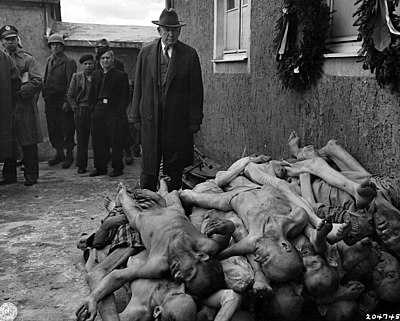Buchenwald Concentration Camp: Difference between revisions
Pat Palmer (talk | contribs) mNo edit summary |
mNo edit summary |
||
| (3 intermediate revisions by one other user not shown) | |||
| Line 1: | Line 1: | ||
{{subpages}} | {{subpages}} | ||
{{Image|Buchenwald-bei-Weimar-am-24-April-1945.jpg|right|400px|Senator Alben W. Barkley of Kentucky, a member of a congressional committee investigating Nazi atrocities in 1945, views a heap of corpses at the Buchenwald concentration camp near Weimar, Germany.}}. | |||
The '''Buchenwald Concentration Camp''' was a Nazi death camp, notorious for medical experiments, in which at least 56,000 inmates died (out of 250,000 prisoners in all). It operated between July 1937 and April 1945 and lay in east-central Germany, about five miles northwest of the city of Weimar, in a wooded area on the northern slopes of the Ettersberg, a large hill or small mountain. | The '''Buchenwald Concentration Camp''' was a Nazi death camp, notorious for medical experiments, in which at least 56,000 inmates died (out of 250,000 prisoners in all). It operated between July 1937 and April 1945 and lay in east-central Germany, about five miles northwest of the city of Weimar, in a wooded area on the northern slopes of the Ettersberg, a large hill or small mountain. | ||
Exact mortality figures for the Buchenwald site can only be estimated, as camp authorities never registered a significant number of the prisoners, all of whom were arrested and sent to the camp by the SS. The SS murdered at least 56,000 male prisoners in the Buchenwald camp system. Some 11,000 of | Exact mortality figures for the Buchenwald site can only be estimated, as camp authorities never registered a significant number of the prisoners, all of whom were arrested and sent to the camp by the SS. The SS murdered at least 56,000 male prisoners in the Buchenwald camp system. Some 11,000 of those killed were Jews. | ||
The | The camp was the site of notorious medical experiments conducted by Nazi doctors on unwilling prisoners.[[Category:Suggestion Bot Tag]] | ||
Latest revision as of 06:00, 22 July 2024
.
The Buchenwald Concentration Camp was a Nazi death camp, notorious for medical experiments, in which at least 56,000 inmates died (out of 250,000 prisoners in all). It operated between July 1937 and April 1945 and lay in east-central Germany, about five miles northwest of the city of Weimar, in a wooded area on the northern slopes of the Ettersberg, a large hill or small mountain.
Exact mortality figures for the Buchenwald site can only be estimated, as camp authorities never registered a significant number of the prisoners, all of whom were arrested and sent to the camp by the SS. The SS murdered at least 56,000 male prisoners in the Buchenwald camp system. Some 11,000 of those killed were Jews.
The camp was the site of notorious medical experiments conducted by Nazi doctors on unwilling prisoners.
